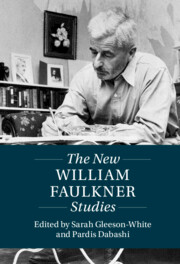Book contents
- The New William Faulkner Studies
- Twenty-First-Century Critical Revisions
- The New William Faulkner Studies
- Copyright page
- Contents
- Notes on Contributors
- Introduction
- Part I Approaches
- Chapter 1 Faulkner and Formalism
- Chapter 2 Faulkner and Modernist Gothic
- Chapter 3 “[T]he critic must leave the Western hemisphere”: Faulkner and World Literature
- Chapter 4 Faulkner and Print Culture
- Chapter 5 Faulkner After Morrison
- Chapter 6 Faulkner’s Acoustics, or Minor Sound
- Part II Cultures
- Part III Interfaces
- Index
Chapter 4 - Faulkner and Print Culture
from Part I - Approaches
Published online by Cambridge University Press: 23 June 2022
- The New William Faulkner Studies
- Twenty-First-Century Critical Revisions
- The New William Faulkner Studies
- Copyright page
- Contents
- Notes on Contributors
- Introduction
- Part I Approaches
- Chapter 1 Faulkner and Formalism
- Chapter 2 Faulkner and Modernist Gothic
- Chapter 3 “[T]he critic must leave the Western hemisphere”: Faulkner and World Literature
- Chapter 4 Faulkner and Print Culture
- Chapter 5 Faulkner After Morrison
- Chapter 6 Faulkner’s Acoustics, or Minor Sound
- Part II Cultures
- Part III Interfaces
- Index
Summary
Immediately following World War II, none of the novels modernist scholars now consider to be William Faulkner’s major works were still in print.1 By 1950, however, paperback reissues of Faulkner’s novels were selling millions of copies. Understanding this sea change is the work of print culture studies, which focuses on all matters surrounding the appearance of an author’s work as a material artifact. Such studies examine not only the real capital generated by the publishing industry (from acquisition to marketing and distribution), but also the symbolic capital that accrues to the author, the publisher, and the consumer.
- Type
- Chapter
- Information
- The New William Faulkner Studies , pp. 67 - 83Publisher: Cambridge University PressPrint publication year: 2022

